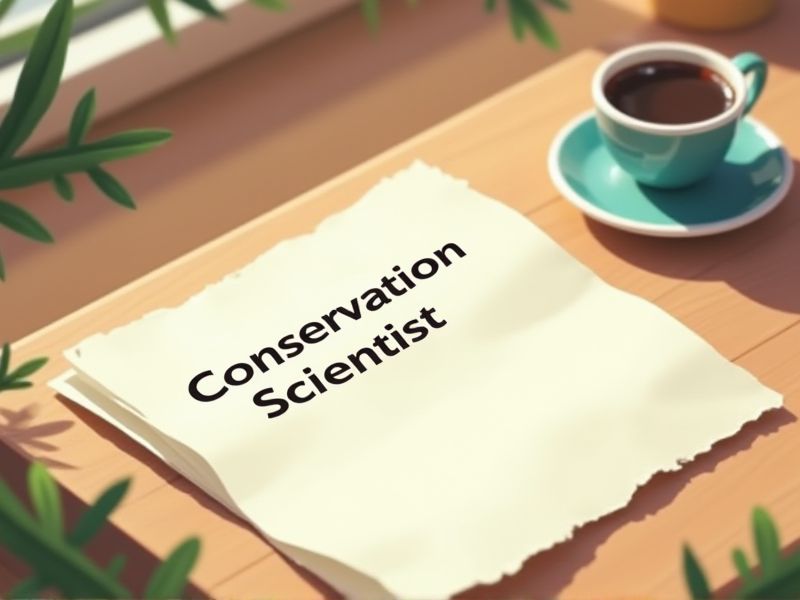
Conservation scientists often require certain certifications to ensure they possess the specialized skills needed for effective natural resource management. These credentials validate a professional's expertise in areas such as ecosystems, wildlife habitats, and sustainability. Certifications also enhance credibility and can improve job prospects in a competitive field. Some crucial certifications for a conservation scientist include CMC, CPR, wilderness medicine, GIS, and PMP.
Certified Wildlife Biologist (CWB)
Certified Wildlife Biologists bring specialized knowledge in animal behavior and ecosystem interactions, crucial for effective conservation strategies. Their expertise ensures that conservation efforts are based on scientifically sound principles, increasing the likelihood of successful outcomes. With rigorous training and certification, CWBs adhere to high professional standards, ensuring integrity and reliability in research and conservation practices. Their involvement often leads to more informed policy decisions, bridging the gap between science and practical conservation measures.
Certified Environmental Professional (CEP)
Conservation scientists often engage in projects that require a thorough understanding of environmental regulations and compliance standards, which a Certified Environmental Professional (CEP) is trained to provide. The CEP credential ensures that conservation scientists are up-to-date with the latest environmental policies and best practices, enhancing the effectiveness and integrity of conservation efforts. Certification as a CEP can improve project planning and implementation by equipping conservationists with advanced skills in assessing environmental impact and managing resources sustainably. Enhanced credibility and professional recognition through CEP certification can lead to greater trust and collaboration with stakeholders in environmental conservation projects.
GIS Professional Certification (GISP)
GIS Professional Certification (GISP) provides conservation scientists with an essential standard of geographical data management skills, enhancing their ability to analyze environmental patterns effectively. GISP equips professionals with tools to precisely map and evaluate biodiversity and ecosystem health, crucial for informed conservation strategies. This certification fosters credibility and trust among stakeholders, which can lead to greater influence and funding opportunities for projects. Adhering to GISP standards ensures that conservation scientists stay current with evolving GIS technologies, improving data accuracy and project outcomes.
Certified Naturalist Certification (CNC)
The Certified Naturalist Certification equips conservation scientists with essential knowledge of local ecosystems, enhancing their fieldwork's effectiveness. It provides them with skills in ecological monitoring, which is crucial for data-driven decision-making in conservation projects. By deepening their understanding of biodiversity, the certification fosters better communication with stakeholders about the importance of preserving natural habitats. It also promotes a standardized approach to conservation, ensuring that scientists adhere to best practices and ethical guidelines.
Certified Ecological Restoration Practitioner (CERP)
Certified Ecological Restoration Practitioners (CERP) are essential for conservation scientists because they bring a standardized expertise in restoring degraded ecosystems. Having CERP certification ensures that professionals adhere to best practices in ecological restoration, which increases the success rate of conservation projects. The certification establishes a framework for continuous learning and staying updated on the latest ecological techniques. This validation of skills and knowledge can lead to increased credibility and trust from stakeholders involved in environmental projects.
Certified Forester (CF)
Certified Foresters possess specialized knowledge that enhances the effectiveness of conservation efforts, as they are trained in sustainable land management practices. The expertise of a CF ensures that forestry resources are managed in a way that balances ecological health with economic needs. A CF's skills in ecology and forest ecosystem dynamics are critical in devising strategies to combat deforestation and habitat loss. Collaboration with a CF aids conservation scientists in implementing scientifically-backed methods for preserving biodiversity and maintaining ecosystem services.
Leadership in Energy and Environmental Design Accredited Professional (LEED AP)
Conservation scientists work to manage natural resources sustainably, and the LEED AP credential equips them with knowledge on energy-efficient and environmentally sustainable practices. Understanding LEED standards allows these scientists to integrate green building strategies in their conservation projects, improving environmental outcomes. The credential provides the scientists with credibility and a deeper understanding of sustainable development principles, which enhances their capacity to influence policy and planning decisions. LEED AP certification connects conservationists with a network of professionals dedicated to sustainable practices, fostering collaboration and innovation in resource management.
Certified Environmental Management System Lead Auditor (EMS Lead Auditor)
A Certified Environmental Management System Lead Auditor helps ensure that conservation projects comply with international environmental standards, leading to more effective resource management. Their expertise in auditing processes can identify inefficiencies and suggest improvements, which supports sustainable practices. The presence of an EMS Lead Auditor facilitates external audits, ensuring transparency and trust with stakeholders and funding bodies. With their certification, conservation scientists can better communicate and implement robust environmental management strategies, increasing the success rate of conservation efforts.
Certified Wetland Scientist (CWS)
Certified Wetland Scientists possess specialized knowledge crucial for accurately assessing and managing wetland ecosystems, which are vital for biodiversity. Their expertise in evaluating wetland health directly supports Conservation Scientists in developing informed management plans. The accurate data provided by CWS professionals enhance decision-making regarding resource allocation and conservation priorities. The certification ensures adherence to regulations, mitigating legal risks and promoting sustainable environmental practices.
Certified Sustainability Professional (CSP)
The growing demand for sustainable land use practices triggers the importance of a Certified Sustainability Professional (CSP) for Conservation Scientists. A CSP brings expertise in evaluating environmental impacts, which leads to more effective conservation strategies. The rising awareness of climate change issues necessitates informed decision-making, where equipping Conservation Scientists with sustainability credentials enhances their credibility. As policies evolve towards stricter environmental regulations, having certified professionals assures compliance and public trust in conservation efforts.
Summary
By gaining certifications, you enhance your credibility and trustworthiness in the field of conservation. Certifications equip you with specialized knowledge, allowing for more effective implementation of conservation projects. This expertise can lead to improved decision-making outcomes and successful conservation strategies. Your certified status also opens doors to better job opportunities and potential career advancements.
